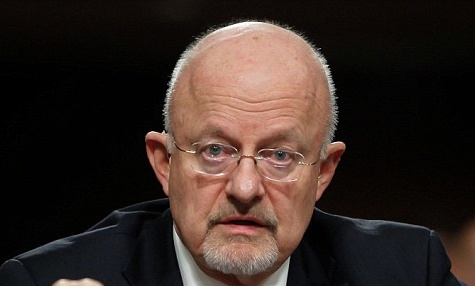The leading US intelligence officials on Thursday briefed the Senate Armed Services Committee about the Russian hacking and rejected President-elect Donald Trump’s position to the contrary.
James Clapper, the Director of National Intelligence, told the committee that his foreign counterparts had expressed concern that Trump was disparaging the US intelligence community, and potentially damaging public confidence.
Clapper said in a briefing broadcast live by the networks: “I do think public trust and confidence in the Intelligence Community is crucial” both in the U.S. and in other countries that rely on U.S. intelligence.
“I’ve received many expressions of concern from foreign counterparts about the disparagement of the U.S. Intelligence Community, or I should say, what has been interpreted as disparagement of the U.S. Intelligence Community.”
The hearing on global cyber threats that focused almost exclusively on Moscow’s alleged hacking during the presidential elections, gave lawmakers and senior US intelligence officials the chance to draw a line in the sand for Trump.
The officials presented a united front on their conclusion that Russia is a major threat to the US and was behind election-related hacking, a conclusion the President-elect has refused to accept.
Clapper said: “We assess that only Russia’s senior-most officials could have authorised the recent election-focused data thefts and disclosures, based on the scope and sensitivity of the targets.”
The trio of Clapper; Undersecretary of Defense for Intelligence, Marcel Lettre; and the Commander of US Cyber Command, Michael Rogers, had written a joint statement to the Senate Armed Services Committee.
Clapper noted that some intelligence agents die in service for their country.
He said: “You only need to walk into the lobby and look at the stars on the wall or the NSA and the number of intelligence people who have paid the ultimate price for their country.”
On his part, Rogers told the committee that he was concerned about morale within the Intelligence Community and that having political leaders who are confident in intelligence agencies is “crucial to that”.
Rogers said: “I don’t want to lose good, motivated people because they feel there’s not room for them to contribute.
“Without that confidence, I just don’t want a situation where our workforce decides to walk because that’s just not a good place for us to be.”
In his opening questions to Clapper, the Committee Chairman, John McCain, noted that the Intelligence Community’s conclusion that the cyber thefts and disclosures were intended to interfere with the US election process and could only have been authorised by Russia’s most senior levels.
Clapper said: “We stand actually more resolutely on the strength of that statement that we made on the 7th of October.”
Clapper said that the hacking did not succeed in changing any vote tallies, but that it was impossible for intelligence to assess how the information released from the breaches affected voters’ attitudes.
McCain emphasised the Russian role and delivered an implicit rebuke to Trump, who has urged people to “move on” from the issue of Moscow-directed hacking.
McCain said: “Every American should be alarmed by Russia’s attacks on our nation.
“There’s no escaping the fact that this committee meets today, in the aftermath of an unprecedented attack on our democracy.”
McCain added that the “goal of this review is not to question the outcome of the election nor should it be.
“It’s crucial that the country move forward with full knowledge about what happened and that Congress take bipartisan steps.”
Russia reacted almost immediately, with Kremlin spokesman, Dmitr Peskov, telling CNN that Moscow is “sick and tired of those irresponsibly blaming everything on our country.
“If there is a need for an enemy, why not to try someone else?
“We have suggested cooperation on combating cyber threats numerous times. It was rejected.”
Previous Article2017 resolution the South East should make, by Charles Ibekwe
Next Article Obama sends delegation to Akufo-Addo’s inauguration


